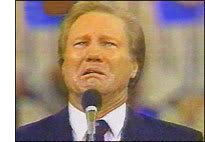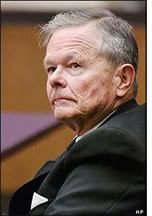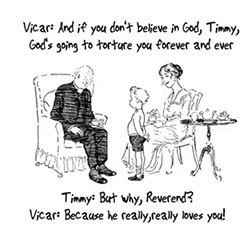Mike’s note: while watching “Harapan” on ABS-CBN last night and surveying the faces in the anti-RH crowd, I spotted someone I used to work for. He left a significant impact on my life, though perhaps for very different reasons than he might like. Anyway, I’d like to share this personal reflection I wrote and posted on my blog some time ago.
This is what an officemate asked me one evening, in all innocence. The words aren’t exactly what was said, but you’ll get the drift:
“So, since you don’t believe in God anymore, you can go and fuck around, and that would be OK, right, won’t be a problem for you?”
In fairness, my officemate’s been a churchgoer his whole life, as was I until about five years ago: I understand the Christian perception of a Godless life as necessarily an immoral one, or at least one without any moral guardrails.
I pondered that point, as I ripped my officemate’s tongue from his head.
– – – – – – –
Or I might have, if he were right about my atheistic lack of a conscience, and if I were the type to take offense. I didn’t take offense; besides, he was wrong: I do have a functioning conscience.
Everything in my life that the priests always told us would be horribly disfigured in God’s absence seemed to be doing just fine without Him. Love for family? Check. Loyalty to my friends? Check. The inclination to do good? Check. Aversion to evil? Check. Preference of truth over lies, of justice over injustice, of love over hate? Check, check, check.
In fact, on all counts I was doing better than Dr. StrangeBrain.
– – – – – – –
Dr. StrangeBrain was a guy I used to work for – he shall remain nameless, because he’s a semi-prominent advertising guy cum political lobbyist cum leader of a religious group.

Dr. StrangeBrain had some strange ideas, most of which would pop out of his mouth when we’d least expect it. “The Simpsons are behind the downfall of Western civilization!” “You know, I can read minds;” “That [famous female CEO of a multinational advertising agency]? She slept her way to the top!” (Said female CEO was, and still is, my idol – you have no idea how that comment blew me away.)
The good Doctor was, most of all, a God-fearing man; he was the head of a fringe Catholic religious community, the specifics of which escape me. In a sense, he was the Godliest of the Godly: of a subset who happen to be more religious than the rest, he was sitting on top of that angelic heap.
– – – – – – –
I worked four years under Dr. StrangeBrain. Four years I’ll never get back.
The man had issues. He may have styled himself a devout Christian, but he had a personality that would make baby Jesus cry. He badmouthed people behind their backs (God knows what he was saying when I was out of the office). He was a typical Dirty Old Man. He fucking worked for the Marcoses for a living, for crying out loud!
But still people came to him for spiritual guidance. Still he would talk about the saving power of religion. Working so close to him made me ask, in my head, the one question that started the ball rolling:
If Christianity made you moral – and more Christianity made you more moral – how the hell do I explain Dr. StrangeBrain?
– – – – – – –
I still can’t explain it, and whenever somebody attempts a rational answer to the question above, it always sounds a little fake to me.
 I am now convinced, though, that there is no relationship between being good and believing in God. Mary McCarthy once wrote that “Christianity is good for good people,” and I haven’t seen anything to disprove that pattern. Good people do good work, and call it part of being a Christian. Some Christians are horrible people, and use their faith to justify their horrible acts. If Christianity were good on a larger scale, wouldn’t slavery have stopped in Constantine’s time instead of in Lincoln’s?
I am now convinced, though, that there is no relationship between being good and believing in God. Mary McCarthy once wrote that “Christianity is good for good people,” and I haven’t seen anything to disprove that pattern. Good people do good work, and call it part of being a Christian. Some Christians are horrible people, and use their faith to justify their horrible acts. If Christianity were good on a larger scale, wouldn’t slavery have stopped in Constantine’s time instead of in Lincoln’s?
You could write a book about the bad things Christians do to their nearest and dearest – and some people do. Mary McCarthy, for one, wrote Memories of a Catholic Girlhood, part of which tells of her time with abusive yet devoutly Catholic relatives. Julia Scheeres wrote Jesusland, an account of her growing-up years spent first in a Fundamentalist Christian household, then in a Christian reform school in the Dominican Republic. How many books, how many true stories do you have to read, to figure out that a faith that lets pedophile priests slide by, or that encourages the beating of helpless children, is a hollow faith, that limps along thanks to the good acts of people who would have been good even without a faith to show them the way?
– – – – – – –

I don’t know where Dr. Strangebrain is anymore, and I don’t care. When he left he took whatever residual fear I had of Hellfire with him; I couldn’t take any afterlife seriously that could reward a man like him.
It might have been that simple, my plain-vanilla rejection of the Faith. I didn’t bid buh-bye to religion because I wanted to do sick, evil, depraved stuff and not have to consider the consequences. There are real consequences to antisocial behavior, even if you don’t believe in God. But that was never the point.
Some people like living in the midst of religious paradox. I’m afraid I don’t have the knack, so I don’t bother. But that wasn’t the point, either.
The fact is we’ve always been told about the rewards that await the pious. We’ve always been told that you’re either Christian and moral – or Godless and otherwise. Wrong, wrong, wrong.
My wish for you is that you realize how wrong these statements are, without a Dr. Strangebrain in your life.


No relation, thank goodness. I'd like you to point out exactly where I overgeneralized, so we might have a fruitful discussion.
I do agree in you in some ways. Yes, it is right for you to say that being atheistic does not automatically translate to being immoral. You are certain that your actions conform with what people consider in consensus as morally sound, or simply good. It is also proper for you to state that the "Dr. Strangebrain" type of person, considering your above-mentioned qualities that pertained to the concealed personality, will truly receive what is due to his actions – hell.
But guess what? I definitely disagree with you stating Dr. StrangeBrain as an example to disprove Christianity or the belief of a religion and of God himself. I hope I got it right when I inferred this perspective from your post. You've just committed a fallacy. Christianity and faith changed many people across the globe. Many testified about God's love to the humanity. I don't want to preach here. Neither do I want to stab and blame your beliefs. All I want to explicitly say is that, think again, reconsider your thoughts.
Hey Brave Heart – please read the essay again, I never used Dr. StrangeBrain "as an example to disprove Christianity". My point was at the conclusion, where I say, "there is no relationship between being good and believing in God." Inasmuch as religion ascribes greater virtue to believers (I've actually had a relative tell me 2 weeks ago, "if you don't believe in God, why are you good?").
That I'm an atheist is true, and that fact is germane to the essay, but the essay is more concerned with virtue and belief in God – specifically the lack of correlation thereof. Cheers.
and my wish for mike aquino (are you related to the current headless head?–hope not) is do not generalize as well and blame a system you don't have much of an inkling of; like all organization may mga bad apples…and like any parent would you throw your children out or kill them if they displeased you…well may be I could but not the Pope…–eh holy nga eh—hindi mo rin naintindihan yon; so stop over analyzing and just live in your good atheist life… not even you can say that you are absolutely right!
No relation, thank goodness. I'd like you to point out exactly where I overgeneralized, so we might have a fruitful discussion.
"and like any parent would you throw your children out or kill them if they displeased you"
So parang si Marlene Aguilar lang?